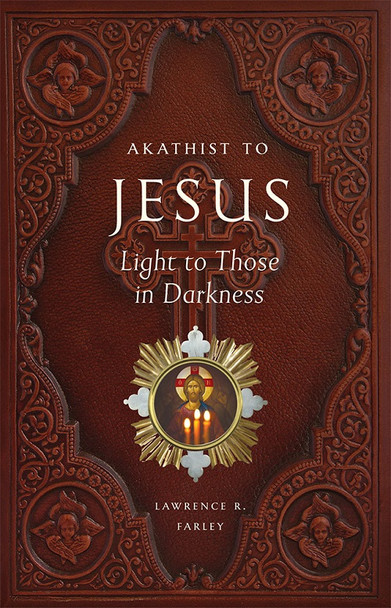
Quite some years ago a parishioner of mine was going through some very deep waters, a terrible time of darkness, a long tunnel with seemingly no light at the end. It was for this person that I wrote the Akathist Jesus, Light to Those in Darkness. Thinking that it might be helpful to a wider audience, I submitted it to some publishers and eventually it was published by Ancient Faith Publishing (available from them here). Since that time I have often received email from people who have shared with me how helpful they have found it. I am grateful to God for this as well as to them for letting me know.
I have also found a Youtube video which contains a lovely choir chanting the Akathist, although to date they have neglected to mention that I am the author of the work. (Their lovely chanting can be found here.)
I wrote the Akathist because, as I said in the introductory essay, eventually everyone comes to dwell in the darkness. I am scarcely the first person to learn that; Christian singer Jaime Owens-Collins shared the same message in her song Seasons of the Soul: “You never dreamed you’d be here. Oh you’re sure this can’t be right and you feel you’ve been forgotten, left alone here in the night. But the darkness hides a treasure, forming diamonds from the coal. So pain contains a promise; such are the seasons of the soul.”
It is easy, especially for those Christians raised in or influenced by the charismatic “Health and Wealth prosperity Gospel” which promises that God will protect His people from sickness, poverty, and suffering, to think that they are immune from the common ills afflicting all children of men. They imagine that they walk through life under a divine umbrella so that it will never rain down the back of their necks, that catastrophe will never knock on their door, that their world will never fall in around them. You would think that the cross they wear around their necks (or at least see in their churches) would tell them otherwise, but apparently not.
St. Peter certainly told them otherwise— he wrote that they were “called” to suffering since discipleship to the crucified Lord meant following in His blood-stained footsteps (1 Peter 2:21). But in our affluent and comfortable West we too often and too easily believe that God will shield us from pain and suffering. It is not so. Eventually we all come to dwell in the darkness, at least for a season. The question is: what do we do when we arrive there?
That is, do we curse the darkness? Do we curse God, revealing ourselves to be fools?— for Proverbs 19:3 tells us that when the foolishness of man ruins his way, his heart rages against the Lord. Do we collapse into a puddle of self-pity? Do we look about to claim our “victimhood identity card” and ever after identify ourselves as victims? Or do we look about to find the one light that shines in the darkness— Jesus, the light of the world, the One who illumines the darkness with His radiant presence.
This last path is the path of wisdom. It is hard to praise God after our own personal apocalypse and after the roof of our former happy life has fallen down upon our heads and we dwell in its ruins. It is hard to lift up a song of exultation and praise to the Lord when our heart is heavy in our chest and our tongue heavier still in our mouth. But if we do praise God we will discover something— something discoverable and attained in no other way.
We will discover that praise to God is the only way out of the darkness, the only real way forward toward healing and wholeness and joy. When we look around us at a universe swept clean of any sight of God and lift up our song to Him anyway, when our praise is an act of defiance, a naked act of will, that is when God begins to build an invincible strength in our hearts, a foundation that nothing can overthrow, the foundation for all future spiritual growth.
And it is then that the Enemy despairs, for there is nothing further that he can do to us. The Enemy knows, even if we do not, that after a night of weeping comes the morning of joy (Psalm 30:5), that the cross is the only path to the resurrection.
That is why I wrote that Akathist. When you come into a time of darkness and you feel alone in the night, here are words to chant and sing, here are words of defiance, words of fire from a heart of pain, words thrown in the Enemy’s face like the Christian’s gauntlet. With these words we defy the darkness; with these words we stand up when hurled down; with these words we trust the sweet love of God no matter how the storm rages over us and soaks us. With these words we look to Jesus, our light in the darkness. Our praise to Him is our lifeline, connecting us to Him. And He will always carry us through.
